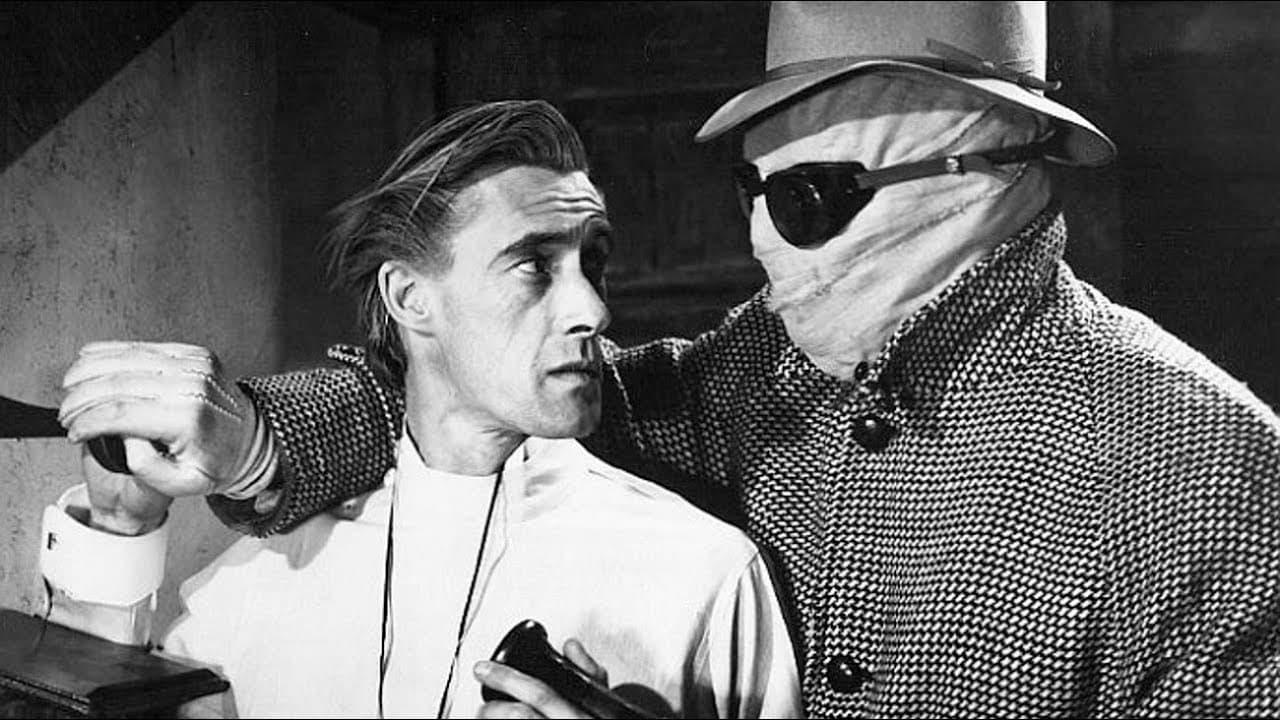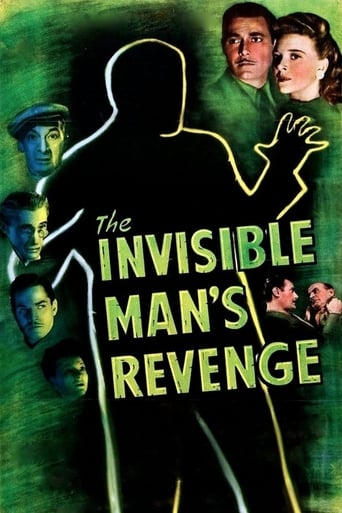


Eccentric scientist Dr. Drury (a nicely quirky and lively portrayal by John Carradine) tests his in visibility formula on wanted fugitive Robert Griffin (a solid performance by Jon Hall), who uses his newfound invisible status to get revenge on his former friends who cheated him out of a fortune in diamonds.Director Ford Beebe relates the engrossing story at a quick pace, maintains a generally serious tone throughout, and further spices things up with amusing moments of amiable humor, with an inspired darts game sequence rating as the definite comic highlight. Moreover, it's acted with zest by an able cast: Leon Errol as hearty old rascal Herbert, Alan Curtis as snoopy reporter Mark Foster, Evelyn Ankers as the sweet Julie Herrick, Gale Sondergaard as the duplicitous Irene, Lester Matthews as shady nobleman Sir Jasper, and Halliwell Hobbes as fussy butler Cleghorn. The special effects run hot and cold. Both Milton R. Krashner's moody cinematography and Hans J. Salter's robust score are up to par. An entertaining movie.
... View MoreThis final entry in Universals' "Invisible Man" series is a rather weak one, unfortunately. It's decidedly lacking in any sort of atmosphere, there's too much unfunny comedy relief, too much time wasting going on, and the special effects are substandard (you can clearly see the wires manipulating some of the objects, for one thing). The script is nothing special, either, although the cast does the best that they can.The film does benefit from having its vengeance minded main character be a true s.o.b. The man in question, Robert Griffin (Jon Hall), thinks that his old partners, the Herricks (Gale Sondergaard and Lester Matthews) double crossed him and cheated him out of a fortune in diamonds. So, when he happens upon a nutty scientist, Dr. Drury (the well cast and delightful John Carradine) who's perfected an invisibility process, he volunteers to be the first human guinea pig, and uses his new "appearance" to his advantage.It's a shame to be referring to any of the films from Universals' 1930s and 1940s horror cycle as tiresome, but that's exactly what "The Invisible Man's Revenge" is. It just isn't very involving; it may have some good moments along the way, but they aren't enough to redeem the film. What makes it bearable is a cast featuring some excellent actors. Hall is very amusing as the determined antagonist, and Carradine is a joy to watch; it's nice to see him playing a victim rather than a villain in this sort of thing. Pros such as Halliwell Hobbes, Leyland Hodgson, Doris Lloyd, and Ian Wolfe are solid in small roles. However, Alan Curtis is fairly dull as reporter Mark Foster, and the film gives the lovely Evelyn Ankers precious little to actually do; her character really isn't *that* important to the plot. Leon Errol is good, although his part is an annoying one.Viewers may want to see this for completions' sake, but it's best recommended that they lower their expectations before watching.Five out of 10.
... View MoreGenerally speaking, the horror films from the "New Universal" period (1937-1946) aren't as good as the ones from the era when Carl Laemmle, Sr. and Jr., were still in control of the studio (though "Son of Dracula," a moody masterpiece, is not only the best in Universal's vampire cycle but the finest vampire film ever made in the U.S.). "The Invisible Man's Revenge" isn't the equal of the peerless 1933 Laemmle-era original, but it's certainly better than the previous run of "New Universal" Invisible Man movies. Jon Hall, relatively dull as the hero in "Invisible Agent," proves surprisingly effective as a full-throated villain (in this version he's a psychotic madman BEFORE becoming invisible); Leon Errol's dry wit is several cuts above the usual un-funny "comic relief" in these films; Lester Matthews and Gale Sondergaard make a nice guilt-ridden couple for the Invisible Man to have his titular revenge on; Alan Curtis and Evelyn Ankers are certainly more than competent as the romantic leads; John Carradine is in good form as the rather dotty scientist with the invisibility formula; and the direction by Ford Beebe, usually a name associated with Universal serials, is convincingly Gothic and well-paced. Universal was on the downgrade as a horror studio by then (and their only further foray into invisible man-dom would be an Abbott and Costello vehicle in 1953) and some of the effects work is sloppy, but on the whole this film is convincing and vividly atmospheric. Incidentally, in "The Face of Marble" from Monogram two years later (another underrated film with a fine sense of atmosphere even though its plot doesn't make a lick of sense even by the meager standards of horror fantasies!), John Carradine also played a mad scientist who had a dog named Brutus.
... View MoreHere's Jon Hall, fresh from his triumphs as 1942's Invisible Agent, back in a rather odd addition to Universal's Invisible Man saga. At first it seems that Jon is the heroic victim of villainous schemers Matthews and Sondergaard (and certainly they seem a rather dubious pair). Halfway through the action, however, the screenplay has Jon change sides (or perhaps just reveal his real obnoxious character). The blackguards then become the victims, but only temporarily. At film's end, we are led to believe (by a chief constable who fails to mention them at all in his summing up) they have been whitewashed, presumably to set the heroine free to marry the movie's real hero, Alan Curtis (who makes a rather belated entrance when the movie is more than half over).Adding to the story confusion is Leon Errol in a major comedy role as a Cockney spiv who befriends the Hall character, and does a fair number of mildly amusing turns, including a happy scene in which he attempts to blackmail the villain who persistently outwits him; and a long, almost completely irrelevant sequence in the local pub in which he challenges the local champion to a game of darts and then tries out various throwing combinations that will have special effects fans really cheering him on. Yet, for all that, Errol is sidelined in the all-action climax where he might have proved useful.As for heroine, Evelyn Ankers, she may as well have stayed at home. If she has more than five or six lines of dialogue in the whole movie, I'd be surprised.My guess is that the script was made up on the run. It certainly plays that way. Only John Carradine's scenes seem to have a formal scenario (necessary because of the special effects), enabling the actor to invest his role with dignity and even credibility. Mind you, Hall does play the heavy rather well, even if it does come as a bit of a shock.By the humble standards of producer/director Ford "Bomba" Beebe, the movie comes over as a fairly creditable production, although lensed on a considerably lesser budget than Frank Lloyd's Invisible Agent.
... View More